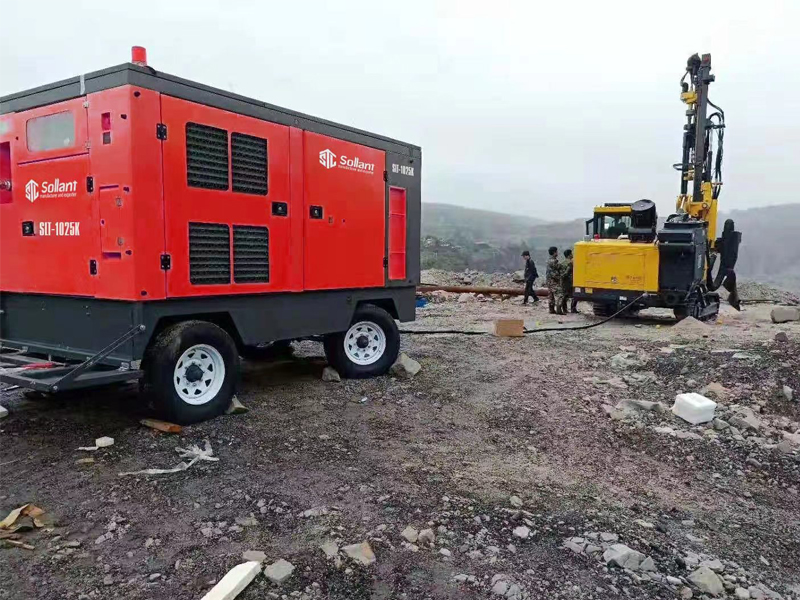Compressed Air Usage in Mining
Air compressors play an integral role in the mining industry, not only in improving mining efficiency but also in ensuring a safe and sustainable working environment. First of all, air compressors play a vital role in mine ventilation. Underground mines often suffer from poor ventilation and air pollution, which can pose a serious threat to the health of workers. By sending fresh air underground, the air compressor not only ensures that the staff can breathe clean air, but also helps to remove harmful gases and dust, improving the safety of the working environment.
Air compressors play a key role in the mining industry as they support key processes in mines such as ventilation, drilling, blasting, drainage, transportation and power supply, helping to improve the efficiency, safety and sustainability of mining operations. Therefore, the air compressor is regarded as one of the indispensable equipment in the mining industry

Air compressors play a critical role in the mining industry, providing a source of clean and compressed air for a wide range of applications. Some key applications of air compressors in the mining industry include:
Drilling Operations: Air compressors power pneumatic drills and rock drills used for drilling blast holes, exploration, and production drilling in both surface and underground mining.
Blasting: Compressed air is essential for initiating controlled explosions in mining operations, breaking large rock formations, and facilitating ore extraction.
Material Conveyance: Air compressors operate pneumatic conveying systems, transporting mined materials, such as ore, coal, and minerals, from one location to another within the mine.
Ventilation: Air compressors supply air to ventilation systems in underground mines, ensuring a continuous flow of fresh air for miners and removing hazardous gases and fumes.
Dust Control: Compressed air is used to suppress dust and airborne particles in mining operations, promoting a safer and healthier working environment.
Pneumatic Tools: Miners use various pneumatic tools powered by compressed air, including jackhammers, drills, and grinders, for excavation and construction tasks.
Tire Inflation: Air compressors are used to maintain proper tire inflation in mining vehicles and equipment, enhancing safety and reducing maintenance costs.
Water Pumps: Compressed air can drive pneumatic water pumps for dewatering mines, controlling groundwater levels, and preventing flooding.
Ore Processing: In mineral processing plants, air compressors are used in flotation cells and agitators to separate and concentrate valuable minerals.
Cooling and Refrigeration: Air compressors help maintain the temperature of mining equipment and facilities through cooling and refrigeration systems.
Emergency Rescue: Compressed air provides the breathing air supply for emergency refuge stations and rescue chambers in case of mine accidents.
Power Generation: Some mines use compressed air to drive turbines for on-site power generation, especially in remote locations.
Instrumentation and Controls: Compressed air is used for instrumentation and control systems that monitor and regulate various aspects of mining operations.
The reliability and efficiency of air compressors are crucial in the mining industry, where downtime and equipment failures can result in significant production losses and safety risks. Therefore, selecting the right air compressor and maintaining it properly are essential for mining companies to optimize their operations and ensure the safety of their workers.
Mobile air compressor features:
1. The diesel mobile air compressor has high reliability: the compressor has few parts and no wearing parts, so it operates reliably, has a long life, and the overhaul interval can reach 40,000 to 80,000 hours;
2. The diesel mobile air compressor is easy to operate and maintain: the degree of automation is high, and the operator does not need to undergo long-term professional training, and can realize unattended operation;
3. The power balance of diesel mobile air compressor is good: there is no unbalanced inertial force, it can run smoothly at high speed, and can realize non-foundation operation. It is especially suitable for mobile compressors, with small size, light weight and less floor space;
4. Diesel mobile air compressor has strong adaptability: it has the characteristics of forced air transmission, the volume flow is almost not affected by the exhaust pressure, and it can maintain high efficiency in a wide speed range.

